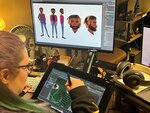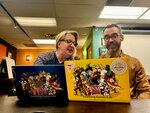

New Mexico State University’s Learning Games Lab mostly does its work quietly, with a team of professional illustrators and animators at work over screens in a darkened room on the Las Cruces campus.
There are louder days, as well, when children are invited into the lab’s meeting room, a place of warm colors, carpeted walls and large screens, to test video games under development and give feedback.
Barbara Chamberlin, who heads the university’s Innovative Media Research and Extension department, explains that the lab’s work is, no pun intended, an extension of the land grant institution’s service mission: to solve problems and improve lives in its community.
The Learning Games Lab develops games, apps and virtual reality presentations geared mainly toward education or professional training.
As an example, the “Math Snacks” game series arose from research into why middle school students were struggling in math. Part of the problem, it was found, came from core concepts in previous school years that were not adequately learned, leaving many students marooned in sixth grade math. The games reviewing and reinforcing those early concepts were developed with support from NMSU’s Arrowhead Center and picked up by educational game distributor Game Learning last year.
Chamberlin says the technologies arise because people receive and process information in individual ways. “Sometimes you can read or hear information, and that’s all you need. That’s great. But sometimes it’s not enough. Sometimes you have to have visuals, to see what’s not seen, or you have to understand something in context, to have an emotional impact. … Our job is to figure out the thing that you can’t learn by just reading about it.”
The lab is funded in part through NMSU’s extension service and partly through project-based grants.
Other games impart food safety information or financial literacy, using the structures and rewards from video games to encourage the acquisition of concepts and counteract less reliable information they may obtain from parents and relatives.
A virtual reality project under development aims to help dietitians practice interacting with patients with challenging diagnoses and treatment regimens, rehearsing interpersonal skills and professional behaviors in a realistic yet simulated environment.
The lab employs 28 people, including some students alongside professional game developers, and nearly every aspect of the finished products are fashioned in-house.
Matheus Cezarotto, an assistant professor and coordinator of the lab, explained that the projects are all research-based, from the problem or question they address to the design of the games themselves.
“We have the formative research to understand what the problem is, what kind of content we’re going to teach,” he said, “and we also have the summative evaluation that we do after, to measure the impact of the tool that we created. … There’s some liberty in being creative, creating characters, but it’s all informed by research.”